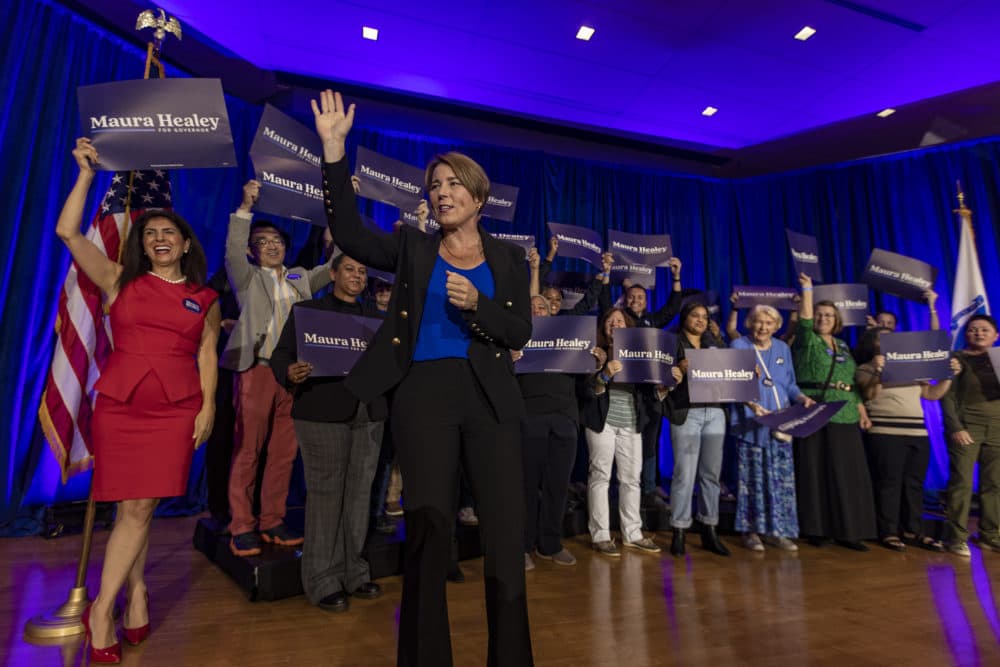Advertisement
Women win 5 of 6 statewide offices in Mass. elections
Resume
Democratic women rolled to victory on Tuesday in Massachusetts, capturing five out of six of the state's constitutional offices, including the governor's office.
Maura Healey's resounding victory against Republican Geoff Diehl means she will become the first woman and first openly gay person elected governor of the commonwealth. Healey and Kim Driscoll, who will become the state's next lieutenant governor, are the first all-female ticket to be elected governor and lieutenant governor in the country.
"I think for both of us, representation matters," Healey said, speaking to reporters in East Boston on Monday. "Seeing is believing, and I've certainly felt the enthusiasm of a lot of little girls out there and of folks generally who are seeing a different look."
The other women who prevailed on Tuesday included Andrea Campbell, who defeated Republican Jay McMahon to succeed Healey as attorney general, becoming the first Black woman to serve as the state's top law enforcement officer.
Diana DiZoglio will become the next state auditor, after Republican Anthony Amore conceded in the race to succeed another Democratic woman, Suzanne Bump.
In addition, Deb Goldberg vanquished Libertarian Cris Crawford — another woman — in the race for state treasurer, a contest in which there was no Republican candidate.
The only man to win statewide office on Tuesday was William Galvin, another Democrat, who clinched an unprecedented eighth term as secretary of state. Galvin beat Republican Rayla Campbell, one of two Black women on the statewide ballot for the major parties. Another Republican woman also lost her bid for statewide office: Leah Allen, who ran for lieutenant governor as Geoff Diehl's running mate.
Until now, just nine women have served in constitutional offices in the state's history. That's nine women in 242 years.
The gender mix — and the actual name plates — of the state's congressional delegation will remain the same, as every incumbent has won reelection to office. Eight of the nine representatives did face challenges in the general election, including some from seasoned political veterans like Republican Dean Tran in the 3rd District and Republican Caroline Colarusso in the 5th District.
Beyond the candidates, voters made their call on four ballot initiatives in the state, choosing to add a 4% surtax on income over $1 million. Referred to as the "Millionaire's Tax" and "Fair Share Amendment" by supporters — and the "Politician's Blank Check" by opponents — Question 1 was the subject of a fierce ad war between the opposing sides, with both accusing the other of lying to voters.
Voters also chose to keep in place a new law that allows unauthorized immigrants to get driver's licenses. Opponents of the law, passed in May, moved quickly to get Question 4 on the ballot. Thanks to the arcane rules around wording ballot referendums, the question was styled as an affirmation of the law, making licensing opponents' message easier to explain: Vote "no" to driver's licenses for people in the state without authorization. But proponents of the law quickly marshaled a lineup of law enforcement officers, including police chiefs, in favor of the measure, saying that making sure people who are likely already driving are at least trained and licensed increases safety.
While both Questions 1 and 4 hit upon themes familiar in modern politics — taxes and rights for immigrants — Questions 2 and 3 offered much murkier fare. With Question 2, voters chose to limit the amount dental insurance companies can spend on administrative overhead. And by rejecting Question 3, voters will not make any changes to how many beer, wine and liquor licenses a business can hold. The other proposed changes for alcohol sellers — including allowing stores to accept out-of-state IDs as proof of age and a ban on booze purchases at self-checkouts — also will not take effect.
Editor's Note: The audio atop this post aired before all of the ballot questions were called by The Associated Press. This written post has been updated with those results.
This article was originally published on November 09, 2022.

